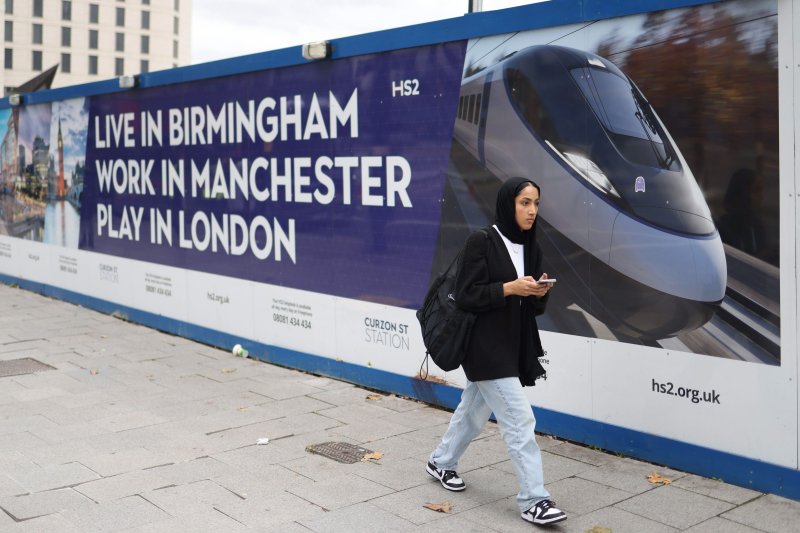Construction hoarding in downtown Birmingham extols the benefits of Britain's $121 billion HS2 high-speed rail project linking London with the north for which the key Birmingham to Manchester section was axed Wednesday. Photo by Neil Hall/EPA-EFE
Oct. 5 (UPI) -- Britain canceled the Birmingham to Manchester leg of a $121 billion high-speed rail line between London and the north, with the money saved to be funneled back into faster rail links between big cities in the north, better, affordable buses, and upgrading roads.
The $58.2 billion in savings from the "spiraling costs" of building phase 2 of the so-called HS2 project would be redirected to daily transport connections that people depend on; unlocking potential, driving growth and transforming communities, Downing Street said in a news release Wednesday.
The change was central to Prime Minister Rishi Sunak's vision to "deliver the forms of transport that people use the most."
"The new plans will radically improve travel between and within our cities and towns, and around our local areas -- benefitting more people in more places, more quickly," No. 10 said.
"This represents a fundamental shift in investment towards the people's transport priorities, consistent with the Prime Minister's pledge to grow the economy while ensuring value for money and demonstrating responsibility with taxpayers' money."
What will be rolled out in place of phase 2 is "Network North" which the government said would boost connectivity across the North and Midlands with faster journey times, increased capacity and more frequent, reliable services across rail, buses and roads.
More than $43 billion will be invested in a new line between Bradford and Manchester, new stations, upgrading and electrifying lines between Manchester and Sheffield, Sheffield and Leeds, Sheffield and Hull, and Hull-Leeds, a new mass transit system in West Yorkshire and more funding for local transport in the North's six city regions.
The plan also promises hundreds of new transport projects in every region of the country.
The remaining $14.5 billion of savings will fund a high-speed rail line linking Liverpool to Manchester that was scrapped in 2021 by then Prime Minister Boris Johnson. However, other high-speed lines linking Manchester and Leeds, and the East Midlands and Leeds that Johnson canceled are not being revived.
Sunak also confirmed that the London to Birmingham phase 1, on which construction began in 2017, will now run the entire 140 miles between London Euston and Birmingham Curzon Street stations instead of stopping short at Old Oak Common in west London.
Wednesday's announcement has been met with consternation by big business, local leaders, the Labor opposition and some in Sunak's own Conservative Party.
"This is the biggest and most damaging U-turn in the history of U.K. infrastructure," said the High Speed Rail Group.
"What we have now is a plan for a railway that will not deliver the transformational benefits the north of England needs," said the body that speaks for rail engineering firms such as Siemens and Hitachi.
Birmingham's Conservative mayor, Andy Street, who had likened the plan to scrap the Birmingham to Manchester leg to "canceling the future," withdrew his threat to quit calling Sunak's new plan a "good compromise," after Sunak extended an olive branch promising to work with him.
He added that given the high-speed line to Manchester was only ever supposed to be completed in 2041, he believed it could still be revived with the help of a private sector consortium he had been working to assemble.
The Labor opposition said the majority of the "new" schemes unveiled by Sunak contained previously announced plans and therefore "could not be described as new investments nor reinvestments."
The HS2 project, with 225 m.p.h. trains to rival France's TGV and Germany's ICE trains has been chipped away at piece by piece as the original $45.5 billion cost rocketed skyward over the years since it was launched by a Labor government in 2009.















